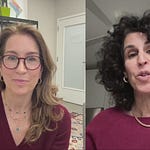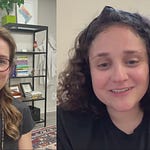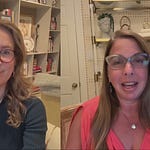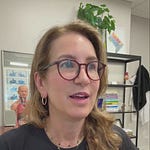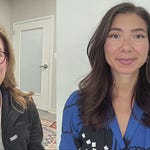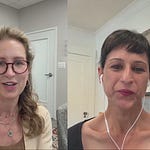Episode Summary
In this conversation, Dr. Lucy McBride speaks with author and journalist Debbie Weil about the surprising truths of aging. Weil, who writes the [B]old Age newsletter on Substack, shares insights from her journey of self-discovery in her 70s, challenging common narratives about aging as inevitably terrible. The conversation explores the unexpected freedoms that come with age and the importance of vulnerability in building community—plus the broken healthcare system's impact on trust, and practical health topics including GLP-1 medications. Both women discuss how authentic storytelling creates meaningful connections and how aging can be a time of continued growth rather than just loss.
Key Concepts
The Surprising Gift of Self-Discovery in Aging
Weil describes discovering that aging involves getting to know your essential self better, rather than losing yourself
Contrary to anti-aging messaging that suggests everything goes downhill, she found increased self-acceptance and authenticity
The process involves recognizing you're fundamentally the same person while becoming more comfortable with who you are
This self-knowledge becomes a foundation for making better decisions about health, relationships, and life choices
Freedom from Others' Opinions and Social Expectations
Many older adults experience liberation from constantly seeking approval or worrying about others' judgments
Weil notes the common refrain among older women: "I don't give a shit anymore" about trivial social pressures
This freedom manifests in practical ways: not wearing makeup if you don't want to, saying no to obligations that don't serve you
The shift allows for more authentic relationships and choices aligned with personal values rather than external expectations
The Power of Vulnerability in Building Community
Weil's most popular writing pieces are those where she shares personal struggles and physical challenges
Vulnerability creates connection by allowing readers to feel seen and understood in their own experiences
Both women discuss how sharing imperfections and uncertainties makes them more relatable and trustworthy as voices in health and aging
Healthcare System Failures and the Crisis of Trust
Dr. McBride explains that only a small percentage of healthcare spending goes to primary care, with the vast majority focused on disease management and hospitalizations
The average patient has just seven minutes with their doctor, creating transactional rather than relationship-based care
This broken system has given rise to the wellness industry, which attempts to fill gaps but cannot replace proper medical care
Trust in healthcare providers requires authentic listening, understanding of individual circumstances, and collaborative decision-making
GLP-1 Medications: Sophisticated Weight Management Tools
Dr. McBride describes GLP-1 medications (like Ozempic) as the most sophisticated medical technology in her lifetime for weight management
These medications work through multiple mechanisms: improving insulin efficiency, suppressing appetite, reducing "food noise," and slowing digestion
Contrary to popular belief, not everyone who stops the medication regains all weight, especially when properly tapered with medical supervision
The medications can help people break cycles of food restriction and emotional eating, leading to healthier long-term eating patterns
Creating Authentic Communities Through Shared Stories
Both women have built engaged communities by sharing personal experiences rather than just dispensing advice
Weil is launching a "No Guilt [B]old Women Book Club" featuring memoirs by older women writers
The power of storytelling lies in helping people feel less alone in their experiences of aging, health challenges, and life transitions
Writing and sharing stories becomes a way to process personal experiences while creating connection with others facing similar challenges







